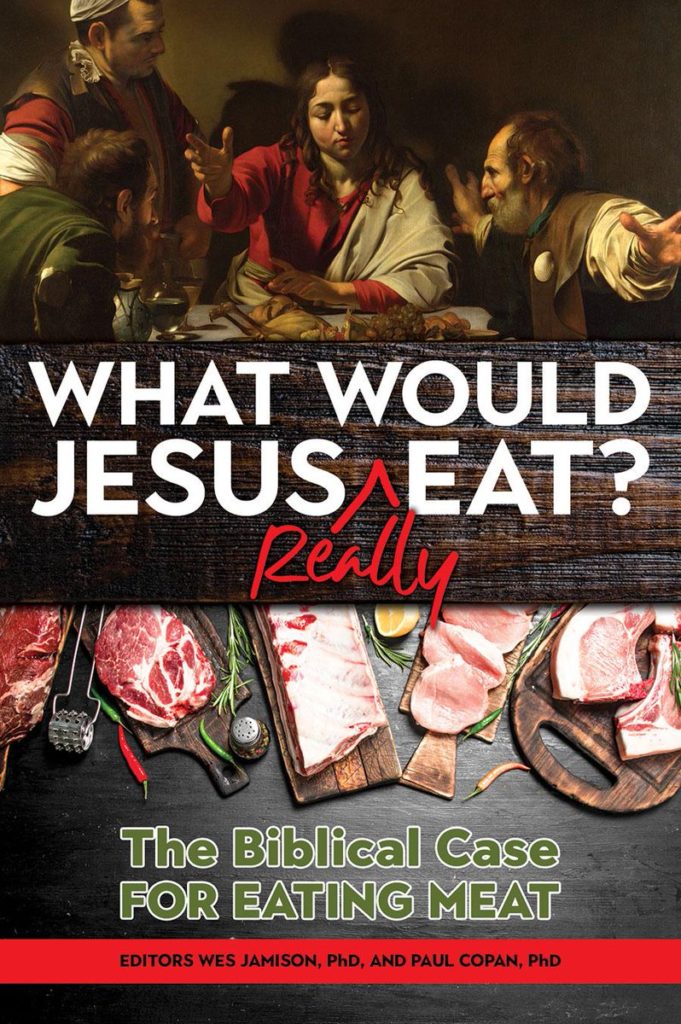We’ve seen animal rights activists dress up in costumes, storm NFL football fields, protest inside grocery stores and do just about anything to gain attention for their cause, but many people don’t know about their efforts in an unexpected area. With activist groups calling for the Pope and others to give up meat, now is the time to become familiar with how animal rights groups are “spinning scripture” (in the words of Paul Copan, PhD, Professor and Pledger Family Chair of Philosophy and Ethics at Palm Beach Atlantic University).
Animal rights groups using religion to petition people to eat less meat is not a new tactic, but it has been gaining traction in recent years. The Humane Society of the United States and People for the Ethical Treatment of Animals are two groups with established faith outreach or religion programs. “Activists re-translate God’s mandate to say something different in their favor” and “cherry pick certain phrases and give them a spin not aligned with the author’s intentions,” said Walter Kaiser, PhD, President Emeritus and Distinguished Professor of Old Testament and Ethics at Gordon-Conwell Theological Seminary at the Animal Agriculture Alliance’s 2016 Stakeholders Summit.
So, why are they targeting people of faith?
- They have sustained beliefs – so once they believe something, they are more committed.
- They traditionally contribute more money to charities.
- Animal issues appeal to their sense of compassion.
- Giving money may help appease guilt associated with knowing animals die for their benefit (guilt that activist groups drive and foster).
Lent is a religious period before Easter in which people of faith refocus their lives on God. It is often characterized by giving up things to help rid oneself of distractions and selfish desires. Unfortunately, Lent is currently being used by animal rights activists to spread misinformation about animal agriculture.

Activist messaging is getting into the hands of children during Sunday School and into sermons as they persuade church leaders. As overwhelming and frustrating as this is, there is hope. Wes Jamison, PhD, Associate Professor of Public Relations at Palm Beach Atlantic University and ordained minister said, the Bible “gives you permission [to use animals] and applauds you for doing so. You have the truth on your side.” The Alliance has resources available for discussing this sensitive topic in your communities, including a book titled “What Would Jesus Really Eat: The Biblical Case for Eating Meat.”
American farmers gratefully receive God’s bounty and graciously share that bounty, using their God-given skills to multiply the harvest.
Raising food is a way of life that requires dedication and a lot of hard work. Farmers and ranchers working to raise the food we all eat, recognize this as both a duty and a privilege. While farm families comprise just 2 percent of the U.S. population, they strive to provide food to 100 percent of the people in our nation. Through innovation, determination and support, they are responsible for the safest food supply in the world.
Good stewardship of God’s gifts demands that farmers make the most products for the most people out of the least resources.
Livestock production is responsible for only 4 percent of U.S. greenhouse gas emissions. Each industry is doing their part to reduce its environmental impact and use of natural resources. Take the beef industry for example. Since 1977, the beef industry decreased its water use by 12 percent and land use by 33 percent. It was also able to reduce its feed input by 19 percent and carbon footprint by 16 percent. Today’s ranchers produce 20 percent of the world’s beef with just 6 percent of the world’s cattle.
The pork industry has reached similar achievements. Since 1960, the pork industry has reduced its water use by 25.1 percent. It has also decreased land use by 75.9 percent, energy use by 7 percent and its carbon footprint by 7.7 percent.
We farm animals because they take creation we can’t use and convert it into things we can; that’s the very definition of biblical stewardship!
Cattle are great recylers. They are able to eat parts of foods that humans cannot digest and turn them into nutrient-rich milk and beef. Citrus pulp and peels, pits and seeds from fruits and vegetables, cottonseeds and grasses are a few things added to a cow’s diet.
Farms and ranches are also able to recycle manure into organic fertilizer for nearby crop fields. Contrary to popular belief, farmers help produce much more than meat. By-products from animal agriculture are in everything from pet food to fireworks, ensuring nothing from the animal goes to waste.
To learn more about animal agriculture, check out the Sustainability Impact Report of animal agriculture in the United States.







